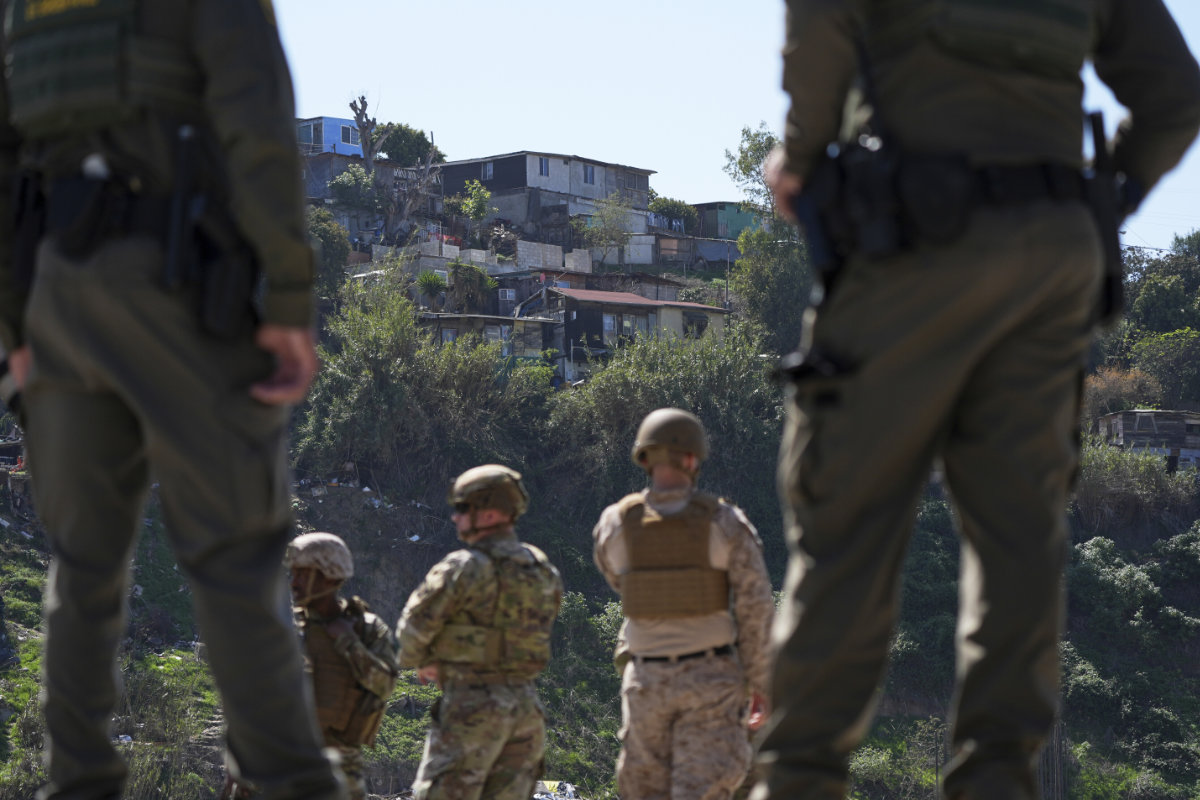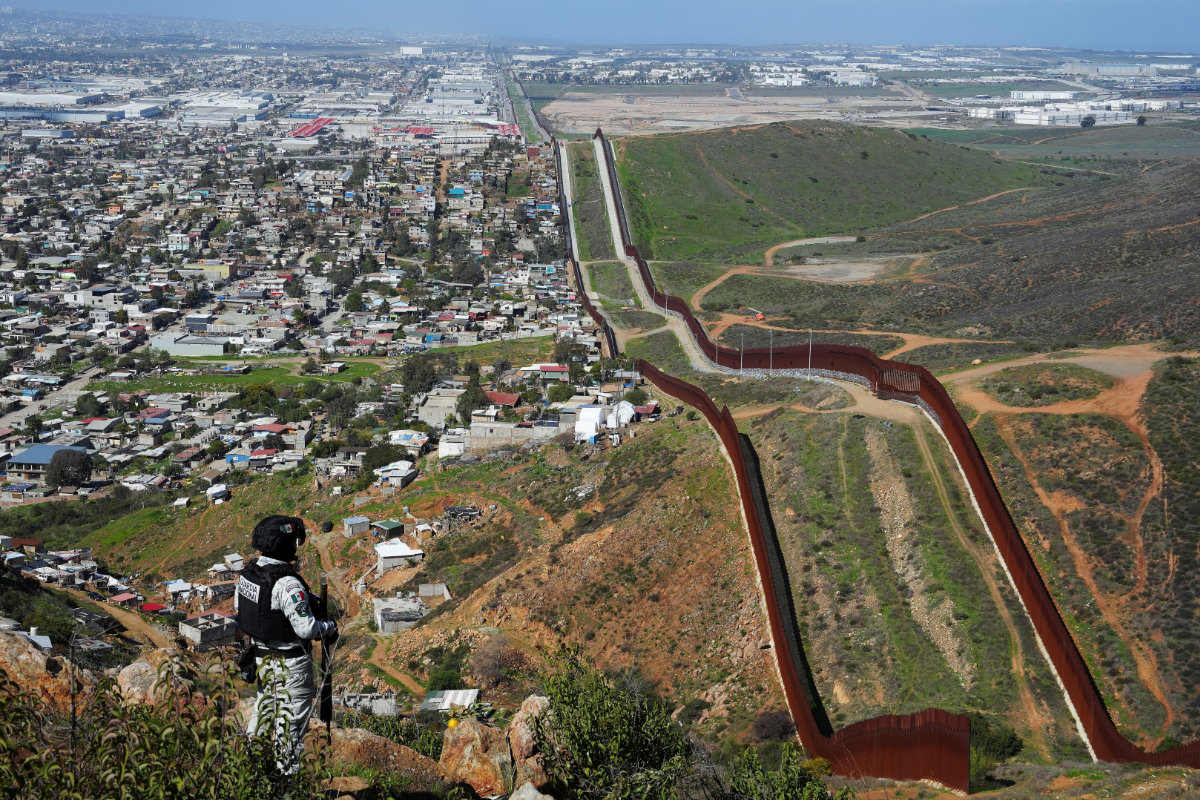SAN DIEGO, California: Lennon Tyler and her German fiancé often took road trips to Mexico when he vacationed in the United States since it was only a day’s drive from her home in Las Vegas, one of the perks of their long-distance relationship.
But things went terribly wrong when they drove back from Tijuana last month.
US border agents handcuffed Tyler, a US citizen, and chained her to a bench, while her fiancé, Lucas Sielaff, was accused of violating the rules of his 90-day US tourist permit, the couple said. Authorities later handcuffed and shackled Sielaff and sent him to a crowded US immigration detention center. He spent 16 days locked up before being allowed to fly home to Germany.
Since President Donald Trump took office, there have been other incidents of tourists like Sielaff being stopped at US border crossings and held for weeks at US immigration detention facilities before being allowed to fly home at their own expense.
They include another German tourist who was stopped at the Tijuana crossing on Jan. 25. Jessica Brösche spent over six weeks locked up, including over a week in solitary confinement, a friend said.

Lucas Sielaff poses for a photo in Bad Bibra, Germany, on March 20, 2025. He spent 16 days locked up in a crowded US border prison before being allowed to fly home to Germany. (AP Photo)
On the Canadian border, a backpacker from Wales spent nearly three weeks at a detention center before flying home this week. And a Canadian woman on a work visa detained at the Tijuana border spent 12 days in detention before returning home last weekend.
Sielaff, 25, and the others say it was never made clear why they were taken into custody even after they offered to go home voluntarily.
Pedro Rios, director of the American Friends Service Committee’s US-Mexico border program, a nonprofit that aids migrants, said in the 22 years he has worked on the border he’s never seen travelers from Western Europe and Canada, longtime US allies, locked up like this.
“It’s definitely unusual with these cases so close together, and the rationale for detaining these people doesn’t make sense,” he said. “It doesn’t justify the abhorrent treatment and conditions” they endured.
“The only reason I see is there is a much more fervent anti-immigrant atmosphere,” Rios said.
Of course, tourists from countries where the US requires visas — many of them non-Western nations — have long encountered difficulties entering the US
US authorities did not respond to a request from The Associated Press for figures on how many tourists have recently been held at detention facilities or explain why they weren’t simply denied entry.
‘Deemed inadmissible’
The incidents are fueling anxiety as the Trump administration prepares for a ban on travelers from some countries. Noting the “evolving” federal travel policies, the University of California, Los Angeles sent a notice this week urging its foreign-born students and staff to consider the risks of travel for spring break, warning “re-entry requirements may change while you are away, impacting your return.”
Immigration and Customs Enforcement said in an email to the AP that Sielaff and Brösche, who was held for 45 days, “were deemed inadmissible” by Customs and Border Protection. That agency said it cannot discuss specifics but “if statutes or visa terms are violated, travelers may be subject to detention and removal.” The agencies did not comment on the other cases.
Both German tourists were allowed into the United States under a program offered to a select group of countries, mostly in Europe and Asia, whose citizens are allowed to travel to the US for business or leisure for up to 90 days without getting a visa in advance. Applicants register online with the Electronic System for Travel Authorization.

Border Patrol agents and members of the military stand inside a gate in one of two border walls separating Mexico from the US March 21, 2025, in San Diego, California. (AP Photo)
But even if they are authorized to travel under that system, US authorities have wide discretion to still deny entry. Following the detentions, Britain and Germany updated their travel advisories to alert people about the strict US border enforcement. The United Kingdom warned “you may be liable to arrest or detention if you break the rules.”
Sielaff arrived in the US on Jan. 27. He and Tyler decided to go to Tijuana for four days in mid-February because Tyler’s dog needed surgery and veterinary services are cheaper there. They figured they would enjoy some tacos and make a fun trip out of it.
“Mexico is a wonderful and beautiful country that Lucas and I love to visit,” Tyler said.
They returned Feb. 18, just 22 days into Sielaff’s 90-day tourist permit.
When they pulled up to the crossing, the US border agent asked Sielaff aggressively, “Where are you going? Where do you live?” Tyler said.
“English is not Lucas’ first language and so he said, ‘We’re going to Las Vegas,’ and the agent says, ‘Oh, we caught you. You live in Las Vegas. You can’t do that,’” Tyler said.
Sielaff was taken away for more questioning. Tyler said she asked to go with him or if he could get a translator and was told to be quiet, then taken out of her car and handcuffed and chained to a bench. Her dog, recovering from surgery, was left in the car.
After four hours, Tyler was allowed to leave but said she was given no information about her fiancé’s whereabouts.
During questioning, Sielaff said he told authorities he never lived in the US and had no criminal history. He said he was given a full-body search and ordered to hand over his cellphone and belongings. He was put in a holding cell where he slept on a bench for two days before being transferred to the Otay Mesa Detention Center in San Diego.
There, he said, he shared a cell with eight others.
“You are angry, you are sad, you don’t know when you can get out,” Sielaff said. “You just don’t get any answers from anybody.”
He was finally told to get a direct flight to Germany and submit a confirmation number. In a frantic call from Sielaff, Tyler bought it for $2,744. He flew back March 5.
‘A blatant abuse’ of US border authorities’ power, victims say
“What happened at the border was just blatant abuse of the Border Patrol’s power,” Tyler said.
Ashley Paschen agrees. She said she learned about Brösche from a TikTok video asking anyone in the San Diego area for help after her family learned she was being held at the Otay Mesa Detention Center. Paschen visited her several times and told her people were working to get her out. Brosche flew home March 11.
“She’s happy to be home,” Paschen said. “She seems very relieved if anything but she’s not coming back here anytime soon.”

A member of Mexico’s National Guard patrols along the primary fence on the Mexico-US border in Tijuana, Mexico, on March 18, 2025, as part of the Mexican government’s response to US President Donald Trump’s demand to crack down on immigration and drug smuggling. (REUTERS)
On Feb. 26, a tourist from Wales, Becky Burke, a backpacker traveling across North America, was stopped at the US-Canada border and held for nearly three weeks at a detention facility in Washington state, her father, Paul Burke, posted on Facebook. She returned home Tuesday.
On March 3, Canadian Jasmine Mooney, an actress and entrepreneur on a US work visa, was detained at the Tijuana crossing. She was released Saturday, her friend Brittany Kors said.
Before Mooney’s release, British Columbia Premier David Eby expressed concern, saying: “It certainly reinforces anxiety that ... many Canadians have about our relationship with the US right now, and the unpredictability of this administration and its actions.”
The detentions come amid legal fights over the Trump administration’s arrests and deportations of other foreigners with valid visas and green card holders, including a Palestinian activist who helped organize campus protests of the war in Gaza.
Tyler plans to sue the US government.
Sielaff said he and Tyler are now rethinking plans to hold their wedding in Las Vegas. He suffers nightmares and is considering therapy to cope with the trauma.
“Nobody is safe there anymore to come to America as a tourist,” he said.































